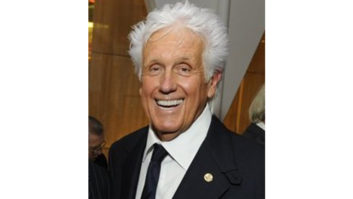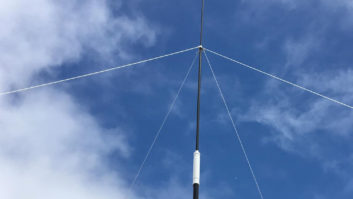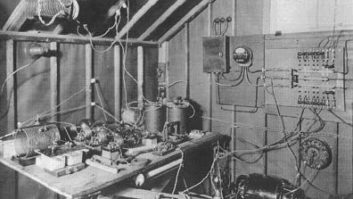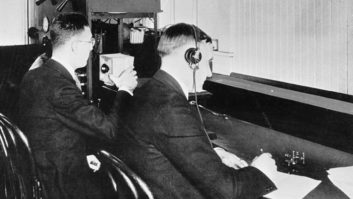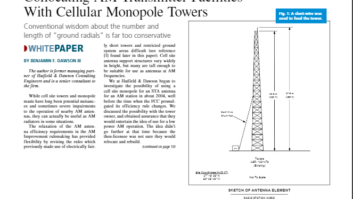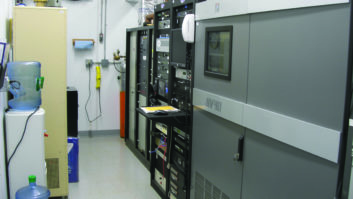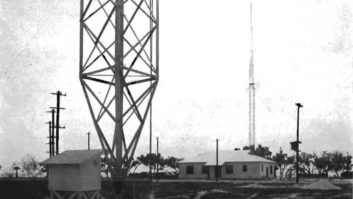Prose on the counterpoise
May 1, 2003 12:00 PM
Nice article in the March 2003 issue, John [Environmental, GroundSystems Problems]. We use an elevated radial system here atWRNJ-AM. It was designed by Clarence Beverage of CommunicationsTechnology in NJ.
To date, we have had no problems with it. I didn’t care for the ideaat first, having always been associated with in-ground systems. But thecost and time to install an in-ground system changed my mind and wewent elevated. I hope you’ll do an article on these systems some daysoon.
Larry Tighe
owner
WRNJ-AM
Hacketstown, NJ
The RF expert
John:
I have read your RF Engineering articles for a long time, and I havesaved many of them for future reference � you know, when you havea problem and you can’t remember the answer or the solution to theproblem. So many times I think that I have read that someplace, then Ilook in my John Battison file and the solution is usually there. Thankyou for sharing all of your expertise and knowledge in the engineeringfield. In the past, I often rushed into fixing a problem, usually doingsomething even though it was the wrong thing to do.
Now that I am a little older and more experience from reading yourarticles, I analyze the problem first and then stand back and take agood look before doing anything. The best time to not do anything iswhen there is a problem with the antenna pattern and you think it iswith the antenna phasor. Now I know: don’t adjust it. The phasorsettings are usually low on the list of things that go wrong. I havenever forgotten your advice in that department. I wanted you to hearsome thank yous for all that you have done to prevent problems in theRF engineering field. I’m glad you are there.
Keep writing those articles, John; I will keep reading them.
By the way, your column is the first page that I turn to when I getthe magazine.
Stan D. Culley
engineer
Powell Broadcasting
Sioux City, IA
Tip of the iceberg
History is an excellent teacher. If you live long enough, you willsee it repeated.
My father was in broadcasting for 30-plus years. Though he was ineducational radio, he had to deal with the same paperwork andrequirements from the FCC as the commercial stations. He hated the FCC.He felt that they were a bureaucracy out of control, seeking only tomake themselves bigger via rulings (read: making and enforcing theirown laws) and intimidation tactics. He felt that the FCC was thebroadcaster’s biggest enemy. Little did he know what the futureheld.
Forward into the past?
Sony was a hardware manufacturer who realized decades ago that homeentertainment hardware is useless unless there is program material theaverage person use with it. When the company came out with the compactdisc, it expected resistance from record companies. Sony thought thingsover very carefully since it didn’t want another VHS-Betamax formatwar. It realized that the big money was in the mass market; it iseasier to sell a million people something for $10 than it is to sellone person something for $1,000. Ultimately, Sony realized it was inthe entertainment business, and started making deals to buy entirecompanies for existing program material in the form of music and moviesto support the new hardware. This general tactic remains among the bestof ways to eliminate opposition to technological change.
Record companies aren’t stupid. They realized long ago that the realmoney is in the distribution deals rather than the actual physicalproduction of a tape or disc. They learned from their close cousins themotion picture industry. When the old studio system ended, the largestudios started to shed the expense of developing talent and creating afinished product. Record companies figured this out years later, and bythe 1980s they also no longer sought out undeveloped talent. While itcould be argued that the quality of the finished product went down, thebottom line is they made more money. Risk was now placed on theindependent artists and producers. If the product didn’t sell, it wastheir loss.
What do they want?
I don’t believe record companies solely want to collect more royaltyfees for artists from broadcasters. (starving or otherwise) It has beenclearly demonstrated by budding Internet radio ventures that theroyalty cost for them now is in excess of 200 times the per capitaprice for a public radio station. This is well above what the trafficcan bear for a new market. Knowing that few business enterprises cansurvive with that kind of burden, why would they pursue a course ofaction akin to squeezing blood from a stone? It doesn’t take too muchto figure out what the record companies want.
Record companies know full well that the future market is in digitaltransmission; currently Internet/satellite radio and some form ofvirtual jukebox that the user pays a flat fee for every month. We alsoknow that record companies would love to increase revenue to the pointwhere broadcasters are paying a lot more than they already do�.but is that really the ultimate goal?
The current system of advertising via selling commercial time androyalties grew out of technological limitations that existed up untilroughly a decade ago. When broadcasting first came into being, it wasnot possible to collect from each listener without passing a lot ofunpopular legislation whereby receivers would be taxed at the time ofsale and/or some form of barely-enforceable licensing system was inplace. When tape recording hit with a vengeance, blank media taxesproved just as unpopular.
Then there were the hokey analog hardware spoiler systems, all ofwhich needed equally unpopular legislative muscle to make a reality.Record companies still actively pursued these avenues, but I’m sure thetop dogs knew they were only buying time.
With digital technology and modern cable/satellite TV digitaltechnology, it becomes a lot easier to incorporate billing and controlsystems inexpensively at a software level for each listener/user. It isalso fairly easy to manage the data for billing. This is the first timein history that this can be done. Knowing that the record companiesknow they can now bill effectively at a user level, don’t you thinkthat they might want to eliminate the middle man? Getting a predictablecut of everyone’s paycheck is the ultimate goal of every business andgovernment. If you’re a record company, why settle for what abroadcaster will give you when you can get a hook in everyone’spaycheck directly?
I feel that the record companies want Internet/satellite radioproviders (and their closely-allied cousins, the MP3 digital musicstores) out of business. They know the market is going in thatdirection, so what do you think they will try to do? Answer: legislatethe current providers out of business, and take over via what isessentially a government-enforced monopoly. DMCA (Digital MillenniumCopyright Act) was pretty well authored by the record companies. Makeno mistake about this: they got what they wanted. With just a smalllegislation change, almost every broadcaster could be out of businessovernight.
The royalty issue is an old one. Many years ago, broadcasters had aproblem with ASCAP. They formed BMI, and only broadcast material frommember artists. As broadcasting flourished, ASCAP took quite a hit, andthey eventually rolled over and cut a deal. Though the ultimate goal ofrecord companies is to put the broadcasters out of business, thesolution is darned similar.
There are plenty of excellent artists hidden in this country. Theyrange from teenagers in garage bands to 50-somethings who have a familyand play folk music on weekends. They are talented individuals withmuch to offer. They would love to sign a waiver for broadcastingroyalties, just so they could be heard. They haven’t a chance ofsecuring a major label contract, and would be thanksful for exposurethat would generate sales for them. It would be in their best intereststo participate, and both sides can only gain from the relationship.
If the broadcasting industry banded together and created a neworganization for the waivers and royalties, they could probably surviveand keep the market share they have. If they don’t, the recordcompanies will take away their cookies, and remnants of broadcastingwill only be found in museums and history books.
Ben Torre
via e-mail
Send comments to:[email protected]





